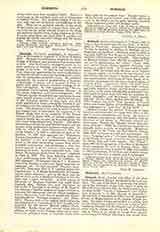

Combefis, FRANCOIS, patrologist, b. November, 1605, at Marmande in Guyenne; d. at Paris, March 23, 1679. He made his preliminary studies in die Jesuit College at Bordeaux, and joined the Dominican Order in 1624. After finishing his theological course, he became professor of theology, and taught in several houses of his order. In 1640 he was transferred to Paris where the opportunities for research afforded by the libraries led him to abandon teaching and to undertake the publication of patristic texts. He published successively the works of Amphilochius of Iconium, of Methodius of Patara, and of Andreas of Crete, together with some hitherto unedited writings of St. John Chrysostom. In 1648 appeared his “Novum Auctarium Graeco-Latinae Bibliothecae Patrum” in two parts, exegetical and historico-dogmatic. The “Historia haeresis monothelitarum sanctieque in eam sextae synodi actorum vindici”, which formed part of the historical section of this work, met with much opposition in Rome, principally because it was at variance with the opinions of Bellarmine and Baronius. The character of the work in which Combefis was engaged met so thoroughly the approval of the French clergy that in an assembly of the French bishops held in Paris, 1655, an annual subsidy was voted to enable him to carry on his publications, the sum voted being subsequently doubled. This generous action produced the most fruitful results, and the number of his publications increased every year. In 1656 he edited St. John Chrysostom’s “De educandis Liberis”, in 1660 a collection of Acts of the martyrs. In 1662 there appeared the “Bibliotheca Patrum Concionatoria”, or “Preachers’ Library of the Fathers”, a rich and comprehensive work, prepared in the most painstaking manner from all the available manuscripts, and containing a short historical account of all the authors whose names appeared in the work. Another important work, “Auctarium Novissimum Bibliothecae Patrum”, appeared at Paris in 1672. The three following years saw many publications from the pen of Combefis. In 1674 appeared “Ecclesiastes Grwcus, i.e. illustrium Grmcorum Patrum ac oratorum digesti sermones ac tractatus”, etc. In 1675 appeared “Theodoti Ancyrani adv. Nestorium liber et S. Germani patriarchre Constantinop. in S. Mariae Dormitionem et Translationem oratio historica”, and in the same year an edition of the works of Maximus Confessor in two volumes with a Latin translation. A third volume of the works of Maximus Confessor was ready when Combefis died. Perhaps the most important of the works of Combefis is his edition of St. Basil in two volumes, “Basilius magnus ex integro recensitus, textus ex fide optimorum codicum ubique castigatus, auctus, illustratus, hand incerta quandoque conjecture emendatus. Versiones recognitie”, etc. (Paris, 1679). This is a work of the highest merit and shows the critical skill of Combefis at its best, though later surpassed by the famous Maurist edition (Paris, 1721-30). Besides these and several other critical editions of works of the Fathers, there are in existence some polemical works of Combefis which havelittle value for the present time. Though known to all the learned men of his time, and widely celebrated even in his lifetime for his great learning, Combefis always remained a mild and obedient monk.
PATRICK J. HEALY

